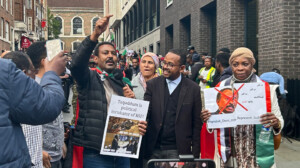Blogger and women’s rights defender could face one year in prison over Facebook video
A human rights and women’s rights defender faces one year of imprisonment over a Facebook video she broadcasted. In the video, she reported on an incident in which several women were harassed by SAF and police officers as they were denied access to a petrol station.
 Women's rights defender and social media activist Waad Bahjat (ACJPS)
Women's rights defender and social media activist Waad Bahjat (ACJPS)
A human rights and women’s rights defender faces one year of imprisonment over a Facebook video she broadcasted. In the video, she reported on an incident in which several women were harassed by SAF and police officers as they were denied access to a petrol station.
“Sudanese authorities should urgently drop all charges and effectively investigate the allegations of ill-treatment against female human rights defender Ms. Waad Bahjat”, argued the African Centre for Justice and Peace Studies (ACJPS) in a statement yesterday.
As a blogger, Bahjat writes and publishes about Sudanese women’s rights. She is also a member of a Resistance Committee in Ombadda that is active in Omdurman and frequently organises peaceful demonstrations promoting civil rights in Sudan.
She was arrested and detained in November last year after she broadcasted a live video on Facebook to document an incident in which several women were denied access to fuel and petrol station in Khartoum and were harassed by police officers and officers from the Sudan Armed Forces (SAF).
The incident
When she went to a fuel station in the El Amarat neighbourhood in Khartoum on November 8 to refuel her car, she noticed soldiers abusing and harassing women lined up in the queue that was designated for women. She noticed, for example, that the officers removed number plates from a car belonging to one of the ladies and that the women’s queue was not moving forward whilst the men’s queue was moving.
When she asked about the situation, she was told that the fuel station would serve women. Bahjat asked to speak with the manager of the station but officers told her that they were in charge.
Then she demanded that women should be allowed to refuel their cars but her plea was rejected and she was insulted by the officers. In a Facebook live video, she talked about the incident and highlighted the discrimination and unequal treatment of the women at the petrol station.
The arrest and the charges
After her arrest, she was taken to the El Imtidad police station and released the following day. Bahjat was charged with defamation, insulting a public servant exercising judicial proceedings, publishing false news, and public nuisance according to the 1991 Criminal Act. She was also accused of attacking a police officer and a SAF officer.
Bahjat pleaded not guilty and refuted the accusation. She also asserted that the police officers used force against her.
According to a reliable source, Bahjat was forcibly taken by a police officer and a SAF officer and, at the police station, her phone was taken from her and she was threatened during the interrogation.
It was also reported that Bahjat was subjected to ill-treatment and abuse. A medical report issued after the arrest indicates that she sustained cuts and bruises on her shoulders and arms.
At a second court session, the Criminal Court dismissed the charges of defamation, insulting a public servant exercising judicial proceedings, and publishing false news. However, the charges regarding the use of criminal force and public nuisance still stand. The next court session is scheduled for today, January 14.
If found guilty, Bahjat could be sentenced to prison for up to one year or receive a fine for both charges.
Discrimination
The ACJPS stated that the use of criminal law to intimidate or silence activists and others who exercise their right to freedom of expression, online and offline, is not new in Sudan. The regime of ousted dictator Omar Al-Bashir frequently relied on crimes of defamation and publication of false news to harass real or perceived critics of the regime.
The New York-based organisation pointed out that Sudan is part of the African Charter on Human and Peoples’ Rights and therefore has a duty to “ensure the elimination of every discrimination against women and also ensure the protection of the rights of women.
They argued that the unequal treatment of the women at the fuel station in El Amarat, enforced by officers on duty, should be immediately addressed by the Sudanese authorities. The organisation also called on the authorities to take the necessary steps, legislative and others, to put an end to discriminatory actions that impair equal enjoyment of rights by women.
The organisation further called on authorities to “guarantee the right to freedom of expression, including online expression”.
Earlier this week the Sudanese Women’s Revolution Initiative held a vigil in front of the Ministry of Justice in Khartoum to protest against rape, sexual harassment, and discrimination against women. Another vigil was held against gender-based violence (GBV) in front of the El Fasher Court in North Darfur.
Last year, the coordinator of the Women’s Group for Peace and Security, lawyer Azza Hasan, discussed the lack of inclusion of women in politics in an interview with Radio Dabanga. She said that “the revolution came to change concepts, but so far there has been no change in Sudan,” and explained that “women and other vulnerable and marginalised groups in the various states of Sudan have not yet obtained their rights as required”.
Radio Dabanga’s editorial independence means that we can continue to provide factual updates about political developments to Sudanese and international actors, educate people about how to avoid outbreaks of infectious diseases, and provide a window to the world for those in all corners of Sudan. Support Radio Dabanga for as little as €2.50, the equivalent of a cup of coffee.












 and then
and then